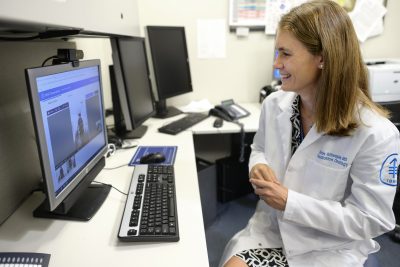A team of MSK researchers recently published a study in the Journal of the National Comprehensive Cancer Network comparing patient satisfaction of pre-COVID in-person visits to satisfaction with telemedicine during the pandemic. Both Chief Healthcare Executive and Healthday reported on the study.

Radiation oncologist and study co-author Erin Gillespie, MD, consults with a patient using telemedicine. Photo: Richard DeWitt
The researchers compared patient satisfaction survey answers from MSK radiation oncology patients. They found no substantial differences in satisfaction between the in-person and telemedicine groups.
Patients with video visits reported a better understanding of their treatment plans than those with telephone-only visits. Two out of three patients reported lower costs with telemedicine, and patients who were unmarried or had lowered ability to perform activities of daily living were more likely to prefer telemedicine, likely because it did not require travel.
While the authors call for long-term study, they conclude that the data supports post-pandemic continuation of telemedicine use in radiation oncology.
